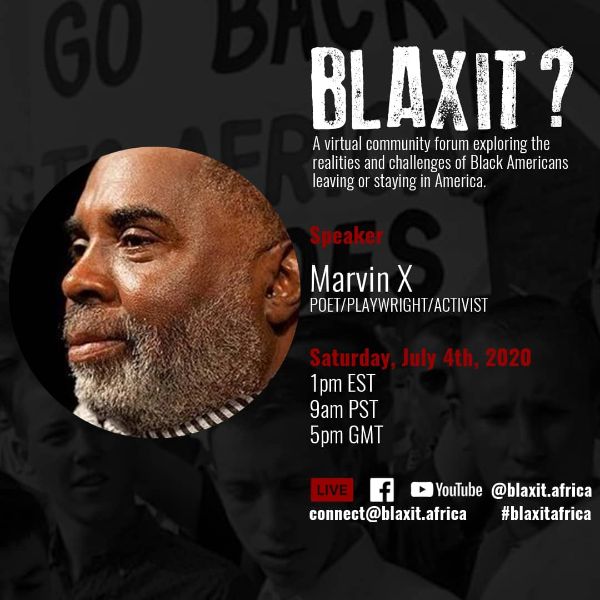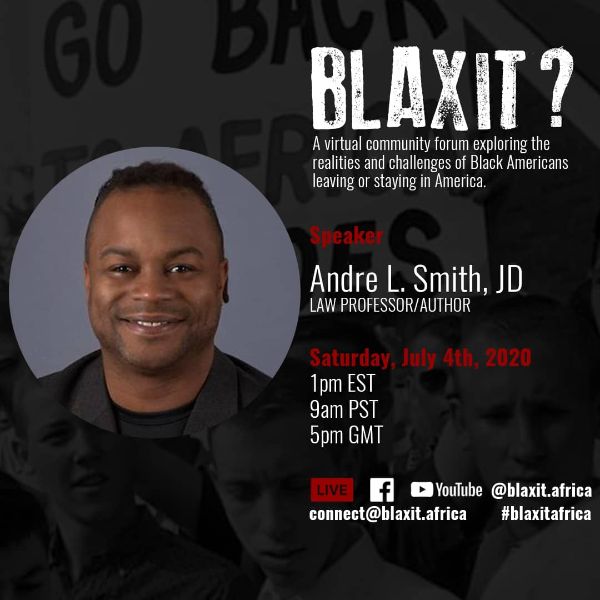Two daughters of Marvin X, Nefertiti and Attorney Amira Jackmon with Cornel West at the Kings and Queens of Black Consciousness Concert, San Francisco State University, 2001
Tuesday, June 30, 2020
Miles Davis - Sketches of Spain (1960) (Full Album)
Two daughters of Marvin X, Nefertiti and Attorney Amira Jackmon with Cornel West at the Kings and Queens of Black Consciousness Concert, San Francisco State University, 2001
Sunday, June 28, 2020
Blaxit: America, Love her or leave her?
Above is the link to the Blaxit forum from Accra, Ghana
|
Thursday, June 25, 2020
BLAXIT Virtual Community forum on leaving or staying in America
Moderator Muhammida El Muhajir
Black Arts Movement Co-founder Poet/activist Marvin X will participate
Wednesday, June 24, 2020
Now Available from Black Bird Press: How to Recover from the Addiction to White Supremacy
Press Release
From:
Black Bird Press
339 Lester Ave. #10
Oakland CA 94606
mxjackmon@gmail.com
510-575-7148
Marvin X/Dr. M
photo Gene Hazzard
"Marvin X is Plato teaching on the streets of Oakland."
--Ishmael Reed, Lecturer Emeritus, UC Berkeley
"Marvin X is the African Socrates teaching in the hood."
--Dr. Cornel West, Harvard University
"Marvin X has always been in the forefront of Pan African writing. Indeed, he is one of the founders and innovators of the revolutionary school of African writing."
--Ancestor Amiri Baraka (LeRoi Jones), Black Arts Movement Co-founder
Black Bird Press has just reprinted Marvin X's classic How to Recover from the Addiction to White Supremacy: A Pan African 12-Step Model for a Mental Health Peer Group, foreword by Dr. Nathan Hare. The police lynching of George Floyd has rocked the consciousness of human beings around the world, but the problem has existed for centuries, from the slave catchers to the police of today. And North American Africans suffer internal violence as well. It is this latter issue that concerns this manual for a mental health peer group, based on the AA 12-Step model, revised for addiction to white supremacy Type II, as described by Dr. Nathan Hare. The officer(s) who lynched George Floyd under the color of law, suffer Addiction to White Supremacy Type I, while George suffered Type II. Whites who suffer Type I must work out their problems, and North American Africans, and African throughout the Diaspora, must find the way to recover from Type II, for we are in many ways "the other white people." Blond wigs and weaves, bleaching cream and attraction to European values of materialism, reveal we are black men and women dipped in chocolate, as Marvin X was told by a young man. Marvin X revises the AA 12-Step model for our purposes, adding the 13th Step: discovery. After all, after recovery shall we attend meetings forever as if we have traded one drug for another. After recovery, we must discover our mission is the liberation of our people throughout the Pan-African world.
In Wretched. of the Earth, Dr. Fran Fanon told us, and Dr. Nathan Hare (Black Anglo Saxons) concurs that the only way the oppressed people can maintain their mental equilibrium is through radical action for true and lasting freedom from all forms of oppression, although white supremacy is the most cunning and vile drug in the world, addicting entire nations and continents.
In his Foreword, Dr. Nathan Hare says, "Who knows, but it may be that Dr. M's (as he calls Marvin X) movement of recovery from addiction to and from white supremacy is offering us a final and effective change to begin to "sit down together" to get together and get our heads together...."
Dr. Mark Christian compares Marvin X to Walter Rodney, Steve Biko, Frances Cress Welsing, Bobby Wright, Nathan Hare and Dr. E. Franklin Frazier. "What I am most impressed with is Dr. M's Pan-Africanist perspective.
How to Recover from the Addiction to White Supremacy is not a book to read but a manual to work. As they say in recovery meetings, "It works if you work it!
Detoxification from White Supremacy
Twelve Steps (13)
Step 1: We are not powerless over self-hatred, racism white supremacy thinking but our lives have become unmanageable
Step 2: We have come to believe that a power within ourselves can restore us to sanity
Step 3: We have made a decision to turn our will and our lives over to the care of God
Step 4:We shall make a searching and fearless moral inventory
Step 5: Admitted to God within and without the exact nature of our wrongs
Step 6: We are entirely ready to have God remove defects of character
Step 7: We humbly ask God to remove our shortcomings
Step 8: Make a list of all Africans and others we have harmed
Step 9: Make direct amends to such people
Step 10: Continue to take personal inventory
Step 11: Seek through prayer and meditation to improve our conscious contact with God
Step 12: Carry the message to the Pan African world and other humans in the global community
Step 13: Discover Pan African consciousness and join the cultural revolution
Also available from Black Bird Press
$29.95
Monday, June 22, 2020
Sunday, June 21, 2020
Wednesday, June 17, 2020
Draft #1 The Movement BAMFEST/BLACK AUGUST 2020
BAMFEST/BLACK AUGUST EDITION 2020 GENEROUS DONATIONS ACCEPTED
Reader Note of caution:
This publication is MARVIN X’S POETIC NOTEBOOK (wherein he exercises Absolute Freedom of Speech, transcending all ideological persuasions, including religiosity and sexuality, and most especially psycho-political linguistic dogmatism and other isms and schisms from the low information vibration mentality).
PUBLISHED IN ASSOCIATION WITH THE BLACK ARTS MOVEMENT BUSINESS DISTRICT, CDC, OAKLAND CA, UNDER THE DIRECTION OF DR. AYODELE NZINGA
and
The National Black Arts Movement
Literary Arm of Black Power Matters
Tuesday, June 16, 2020
Review, The Wisdom of Plato Negro--Renaissance of Imagination
Renaissance of Imagination
A Review of The Wisdom of Plato Negro
parables, fables
by Marvin X
Review by Rudolph Lewis
For Marvin X, a founder and veteran of the Black Arts Movement of the late 60s/early 70s, we who strive for a rebirth of humanity must choose to be a mentor rather than a predator. “No matter what, I am essentially a teacher,” he lectured at California College of the Arts, where he was invited by poet devorah major. Marvin has taught at Fresno State University; San Francisco State University; UC-Berkeley and San Diego; University of Nevada, Reno; Mills College, Laney and Merritt Colleges in Oakland. But, Marvin warns, “The teacher must know . . . no matter how many years he gives of his soul, his mental genius is not wanted” (“Parable of the Poor Righteous Teacher,” 12).
Gov. Ronald Reagan ran him out of Fresno State University, 1969, with the help of the FBI’s Cointelpro which employed a hit man who sought him out after an agent provocateur murdered his choir director Winfred Streets, who died from a shotgun blast to the back (“Parable of American Gangsta J. Edgar Hoover,” 171).
Pressured out of black studies academia, Marvin contends such programs now attract “sellout” Negroes, or if such African American elites are sincere and dedicated and allowed to remain, many die early from “high blood pressure, depression, schizophrenia, paranoia.” One or more such conditions, he believes, brought on the early and unexpected deaths of poet June Jordan, scholars Barbara Christian, and Veve Clark at UC Berkeley and Sherley Ann Williams at UC San Diego (“Parable of Neocolonialism at UC Berkeley,” 115). There remain nevertheless many educated colored elite all too willing to put “a hood over the hood” and lullaby the masses with “Silent Night,” while “colonialism [is] playing possum” (“Parable of the Colored People,” 42).
In “Wisdom of Plato Negro,” Marvin teaches by stories, ancient devices of instruction that appeal to a non-literate as well as a semi-literate people. (Fables differ from parables only by their use of animal characters.) The oldest existing genre of storytelling used long before the parables of Jesus or the fables of Aesop, they are excellent tools, in the hands of a skilled artist like Marvin X, in that he modifies the genre for a rebellious hip hop generation who drops out or are pushed out of repressive state sponsored public schools at a 50% clip. Marvin X is a master of these short short stories. Bibliographies, extended footnotes, indexes, formal argumentation, he knows, are of no use to the audience he seeks, that 95 percent that lives from paycheck to paycheck.
These moral oral forms (parables and fables), developed before the invention of writing, taught by indirection how to think and behave respecting the integrity of others. Marvin explained to his College of Arts audience, “This form [the parable] seems perfect for people with short attention span, the video generation . . . The parable fits my moral or ethical prerogative, allowing my didacticism to run full range” (“Parable of a Day in the Life of Plato Negro,” 147). But we live in a more “hostile environment” than ancient people. Our non-urban ancestors were more in harmony with Nature than our global racialized, exploitive, militarized northern elite societies.
The American Negro or the North American African, as Marvin calls his people, is a modern/post-modern phenomenon, now mostly urbanized, and living in domestic war-zones for more than three centuries. Black codes have governed their speech and behavior; they have been terrorized generation to generation since the early 1700s, by patty rollers, night riders, lynchers, police and military forces, usually without relief by either local or federal governments, or sympathy from their white neighbors or fellow citizens, though they have bled in the wars of the colonies and the nation to establish and defend the American Republic. Their lives have been that of Sisyphus, rising hopes then a fall into utter despair. Such are the times we still live.
To further aide the inattentive reader, most of the 83 sections of this 195-page text begins with a black and white photo image. Although most of these parables were composed between January and April 2010, some were written earlier. A few were written in 2008 (e.g., “Parable of the Basket,” 109) during the election campaign, and a few in 2009 (“Parable of Grand Denial,” 153) after the installation of Barack Obama as president of the United States. Three of these short short stories—“Parable of the Man with a Gun in His Hand,” “Parable of the Lion,” and “Parable of the Man Who Wanted to Die”—were first published in the June 1970 issue of Black World. His classic “Fable of the Black Bird” (86) was written in 1968. The “Fable of the Elephant” (7) and the “Fable of Rooster and Hen” (97) are quite similar in form and style to the black bird fable.
Marvin’s traditional or “classic” parables and fables, written during the BAM period, differ from the ancient fables and parables, which were told in an oral setting within a rural community with some wise men available by a campfire or candle light to explain the story told. In written form the writer in some manner must explain or make the meaning evident, preferably without the mechanical explanation tacked on. That would be a bore and not quite as pleasing to a hip urban audience, as what has been achieved by Marvin’s improvisation on the genre.
Thus Marvin uses humor, sarcasm, irony, exaggerated and sometimes profane language of one sort or another to capture the inattentive reader’s attention. In the first parable, “Parable of Love” (2), Marvin explains, “every writer is duty bound to speak the language of his people, especially if he and his people are going through the process of decolonization from the culture of the oppressor.” His parables are “highly political” and intended also as a kind of “spiritual counseling.” As he points out in “Parable of Imagination,” artists in their work must “search the consciousness for new ways of representing what lies in the depth of the soul and give creative expression to their findings” (160).
“Under the power of the devil,” our lives tell us a story we hardly understand, Marvin discovered from his teachers Sun Ra, Elijah Muhammad, and others. The church, the mosque, the temple do not provide the needed spiritual consciousness for out time. Nor do 19th century radical political ideologies. As Stokely Carmichael told us in 1969, ideologies like communism and socialism do not speak to our needs. They do not speak to the issue of race. We are a colonized people, he argued, whose institutions have been decimated, our language mocked (e.g. Bill Cosby), our culture when not yet appropriated and stolen called “tasteless” by black bourgeois agents or stooges (e.g., Jason Whitlock in his criticism of Serena Williams at Wimbledon doing a joyful jig after her victory and winning a gold medal).
In “Wisdom of Plato Negro,” Marvin X is about the work of decolonization, though BAM has been commodified as a tourist icon at academic conferences and in university syllabi. The “sacred” work of the artist remains. Its object is to “shatter lies and falsehoods to usher in a new birth of imagination for humanity” . . . to “promote economic progress and political unity” . . . to undermine “pride, arrogance, and self-importance” (160). Although he is critical of the black bourgeoisie, Marvin knows that they have skills our people need, that we must find a way to bring them home. They must learn to have as much respect for the Mother Tongue as they have for the King’s English (“Parable of the Black Bourgeoisie,” 35).
“Wisdom of Plato Negro” deals not only with the political but also with the personal. That means he cannot live his life in an academic (or ivory) tower, or up in a mountain, writing and publishing books. In “Parable of the Man Who Left the Mountain,” written in 2008, he explains, “in the fourth quarter of my life, I can only attempt to finish the work of being active in the cause of racial justice, of using my pen to speak truth, to put my body in the battlefield for the freedom we all deserve” (45).
Though he sees the problem as economic and political, one that keeps us poor and powerless, our oppression is “equally” one that creates “a spiritual disease or mental health issue.” (45). Racial supremacy for him not only affects the body or the potential to obtain wealth, it also affects the soul. It is at the heart of the drug war crisis. Black people seek to “medicate” themselves with drugs or the ideology of racial supremacy to find relief from the pain of racial oppression and the suppression of the imagination. Drugs and racial supremacy both are addictive and create dependency. In numerous instances, Marvin calls for moderation of desires and discipline, to “detox” from an addiction to racial supremacy and other “delusional thinking” (“Parable of Sobriety,” 177).
Marvin centers himself in his “classroom/clinic,” his “Academy of da Corner” at 14th and Broadway, Oakland, California. There he sells his “empowering books” and offers insight, advice to mothers (e.g., “Parable of the Woman at the Well,” 58), wives (e.g. “Parable of the Preacher’s Wife,” 29), and lovers. “Other than the white man, black men have no other pressing problem—maybe with another brother, but 90% of the brothers come to Plato with male/female problems” (“Parable of a Day in the Life of Plato Negro,” 148). In contrast to his street work, the racial experts seem rather lost. Marvin reports on a 2008 conference held in Oakland by the Association of Black Psychologists, which has a membership of 1,500 Afrocentric psychologists. Even the experts with two and three Ph.D., “victims of white witchcraft,” he discovered do not know how to heal the community. When leaders don’t know, “why not turn to the people?” (“Parable of the Witch Doctor,” 24).
There is much more that can be gained from a slow reading of “Wisdom of Plato Negro” than what I have tried to recall in this short report. Marvin X writes about such topics as sexuality and creativity and their relationship, on war, the weather and global warming, and numerous other topics that all tie together if we desire to bring about a rebirth of humanity. This highly informative, insightful, and creative volume can be of service to the non-reader as well as students and seasoned scholars, if they want to be entertained or to heal their bodies and souls so that they can become mentors rather than predators.
“Wisdom of Plato Negro” ends with the “Parable of Desirelessness” (193), which mirrors the “Parable of Letting Go” (61). In the materialist culture of contemporary capitalism we are beset on all sides by “greed, lust, and conspicuous consumption.” There are a “billion illusions of the monkey mind” that lead nowhere other than an early death, suicide, or cowardly homicide. We all must “hold onto nothing but the rope of righteousness.” That will guide us along the straight path to full and permanent revolution and liberation.
Rudolph Lewis is the Founding Editor of Chickenbones.com, A Journal.
www.blackbirdpressnews.blogspot.com
Monday, June 15, 2020
Saturday, June 13, 2020
It's lonely at the top, at the bottom too!
It's lonely at the top, lonely at the bottom too. They say (whomever they are) to have a friend one must be a friend. But what do you do when friends join the ancestors, or get old, sick and crazy? How can one be a friend to such persons who are out of their minds. They say things to you but don't remember what they said. They accuse you of things you would surely never do.
So one must walk alone, just to stay out of the stress zone. Nobody needs stress, nomatter what age.
The writer loves solitude, thus loneliness is not a consideration, but a given, except we know solitude is not necessarily loneliness. For the writer solitude is bliss. The writer cannot have the lover looking over his shoulder at what he is writing. The lover comes into the room and says coyly, "Do you mind if I masturbate while you write your poem?" It was a poem never finished. It disappeared into the ether of love. You know I told her there was no need of masturbating, or I showed her, just to be truthful. But the poem was lost. I've never seen it again. And does it matter, certainly not to the lover.
So I write best in solitude, where and when I can best express my imagination. I write alone, I walk alone. What do they tell you in jail and prison? Ride your own beef!
Don't worry about a nother nigga's beef. Stay in your own lane and drive. Your best friend may betray you, your lover, wife, brother, sister.
Who can be trusted? Often you cannot trust yourself! How many times has your mind played tricks on you? Walk alone with God ad your friend. If you fall, He will catch you time after time! Ache'!
--MARVIN X
6/13/20
18 Shares
Comment
Subscribe to:
Comments (Atom)
-
In conversation with several North American African elders between eighty and ninety years old, the consensus is that the present situation ...
-
His Black Consciousness Program Rocked the Bay Area like no other black panthers black arts black studies kwanza Khalid Ab...































